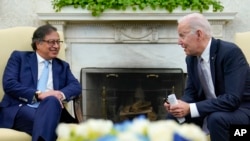U.S. President Joe Biden welcomed to the White House the leftist President Gustavo Petro of Colombia, a country Biden described as the “keystone” to the Western Hemisphere.
"I've long believed, as you probably know, that Colombia is the key to the hemisphere — and I mean that sincerely — the keystone,” Biden said to Petro before their meeting. “And I think we have an opportunity, if we work at it hard enough, to have a Western Hemisphere that is united, equal, democratic and … economically prosperous.”
The two met amid disagreements over policies, such as how the war on drugs is being waged, as well as Bogota’s renewal of ties with neighboring Venezuela.
But the two leaders focused on areas of agreement. Speaking through an interpreter, Petro said “democracy, freedom and peace” constitute the two countries’ common agenda.
Petro also called for a move toward a carbon-free economy.
"We have the greatest potential for democracy and freedom in the Americas, as well as the greatest potential for green energies," he said.
Petro, an economist and former member of Colombia's M-19 guerrilla group, won the 2022 presidential election with the support of voters frustrated by rising poverty and violence.
Regional experts say the most promising areas for cooperation between the two countries are migration issues and the global effort to combat climate change by moving away from fossil fuels.
Migration
Biden thanked Petro for accepting approximately 2 million Venezuelan refugees in his country, and said his administration is working with regional partners to help Colombia meet this challenge.
With ongoing economic and political crises at home, Venezuelans have been one of the largest groups of migrants involved in illegal crossings at the Mexico-U.S. border.
Earlier this month, the U.S., Colombia and Panama announced a 60-day campaign aimed at shutting the flow of illegal migration through the Darien Gap, a dangerous but preferred route for migrants heading to the U.S. from South America that has seen a sharp influx of migrants this year.
Venezuela
The Nicolas Maduro government in Venezuela has been locked in a power struggle since January 2019, when the now-ousted opposition leader Juan Guaido declared himself acting president with the backing of the National Assembly following disputed elections the year before.
The Trump administration recognized him as president, and Washington followed with a maximum-pressure campaign of sanctions on various sectors of the Venezuelan economy, including freezing its assets abroad.
Former Colombian President Ivan Duque was a consistent U.S. ally in isolating Venezuela. But since taking office, Petro has reopened his country’s border and reestablished ties with the Maduro regime.
Geoff Ramsey, a senior fellow at the Atlantic Council's Adrienne Arsht Latin America Center, said there is a consensus between the Biden and Petro administrations that Trump’s maximum-pressure strategy has not worked
“It's more of a question of using the pressure that we have, using the leverage that we have, which in this case means financial sanctions, to try to extract concessions from the Maduro regime,” he told VOA.
The Venezuelan government and opposition have also been engaging in talks sponsored by Norway that resumed in November after a deadlock in October 2021.
Igor Cuotto, an expert on negotiation and conflict resolution based in Caracas, said Washington should continue supporting the Norwegian-led process to push the Venezuelan government to conduct a free and democratic election.
“But in order to achieve that goal, they need to negotiate with those countries that are quite close to [the] Maduro government, for example, Mexico, Colombia and right now, Brazil,” he told VOA.
War on drugs
Petro has been critical of Bogota’s decades-long partnership with Washington on the forced eradication of coca, the base ingredient of cocaine, an approach he believes harms small farmers. He prefers to go after money launderers and large-scale drug traffickers.
"We believe that the war on drugs has failed. These 50 years have shown an absolutely disastrous balance in numbers both here, in the United States, and in our Latin America," Petro told reporters Thursday.
Petro’s approach is a departure from the traditional counternarcotics collaboration under Plan Colombia, said Benjamin Gedan, director of the Wilson Center's Latin American Program. Plan Colombia refers to a 1999 U.S. military and diplomatic initiative aimed at combating drug cartels and left-wing insurgent groups in Colombia.
The United Nations Office on Drugs and Crime reported that in 2021, Colombian land sown with coca increased by 43% to 204,000 hectares, and its potential cocaine output rose by 14% to 1,400 metric tons.
“Nobody thinks that the counternarcotics strategy of the last decades has worked. I think everyone is open to new ideas and creative thinking,” Gedan told VOA. “We'll see if Presidents Biden and Petro can see eye to eye on a new way forward.”
Petro said he will ask Biden to support his proposal for "total peace.” The plan to end armed conflict in Colombia has faced major challenges, including last month’s suspension of a cease-fire with the country's main drug trafficking cartel.
A March report by the International Committee of the Red Cross showed that, while violence between the Colombian military and armed groups has dropped, more than 180,000 civilians were displaced in 2022.





